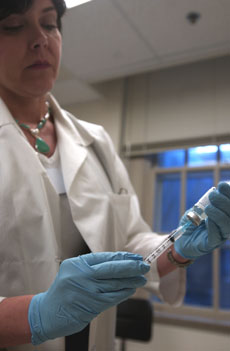Study abroad requires immunizations

Online Poster
December 13, 2005
As students at the University plan to study abroad in the coming months, they will be required to get certain immunizations depending on their destinations.
Taking the proper preventative health measures is one of the steps students should take to plan ahead said Jeremy Geller, director of the Study Abroad program at the University.
Erika Ryser, associate director of Study Abroad, said the only recommendation the Study Abroad Office makes is to follow the recommendations of the Centers for Disease Control and Prevention and the McKinley Health Center. McKinley’s travel clinic offers vaccines to students.
Students must go through one of three Health and Safety Orientations held each school year by the Study Abroad Office. Students view a PowerPoint presentation and are given materials on health and safety matters with advice on being mindful of what immunizations are recommended or required.
Both Ryser and Geller recommend their students use the center’s Web site, which Geller describes as very elaborate.
Get The Daily Illini in your inbox!
“There is no substitute for the student looking at these,” Geller said about the site’s information.
He also said that medical advisers refer to it often.
Ryser said in addition to making judgments with the center’s Web site, students should consult their family, physician and the travel clinic at McKinley.
Some countries require specific immunizations for entry, and there are also certain health insurance requirements for traveling outside the United States. The center’s Web site provides this kind of legal information and also includes references to state departments, lists of diseases and preventative measures for each region and medications that should be continued after returning home.
Certain immunizations require multiple shots with proper spacing between them, so students should allow adequate time to receive them. Many need to be taken two to six months in advance of traveling, so students should plan ahead. If they find out about additional vaccines after entering the foreign region, students can still get them in that country.
“There is less concern for students traveling to urban or high-land areas such as mountainous regions,” Ryser said.
For rural or coastal areas, it is even more important to learn about the behaviors and infections found there.
In certain areas of the world such as Eastern Europe, the Caribbean and parts of Asia, malaria is common. Geller said the bugs that carry malaria are different across regions where malaria is found, so the students should plan to take an antimalarial drug. Malaria can be fatal but it is preventable, as stated on the Centers for Disease Control and Prevention’s Web site.
He also said there are risks for contracting Hepatitis A or B, so students should check with their physicians about being immunized from these. Tetanus-diphtheria immunizations should also be current before traveling anywhere.
Ryser said if volunteering with children or animals, there are additional precautions and vaccines to consider. Animal bites can lead to rabies and even plague.
Students should also be mindful of food-borne illnesses. One should consider how, when and where the item was prepared.
“Eat only thoroughly cooked food or fruits and vegetables you have peeled yourself,” instructs the center’s Web site. “Remember: boil it, cook it, peel it, or forget it.”
Geller said that to travel to Europe, one generally does not need additional immunizations but should be current on the vaccines required to enter the University.
Danielle McCarthy, senior in LAS, is traveling to London, England, this winter break. She had a physical examination but is not required to get additional vaccinations because she is going to an area in Western Europe.
Her instructor warned her about how one’s immune system becomes weaker while traveling and also how to handle jet lag.
“My teacher gave me things to avoid,” McCarthy said.
Other warnings of diseases common in the United States still remain. Geller said that forms of HIV/AIDS are the same as those found here in Champaign-Urbana. Risky behaviors are also the same, such as sexual intercourse without protection or sharing needles.
“When you travel, don’t leave your good sense behind,” Geller said.






